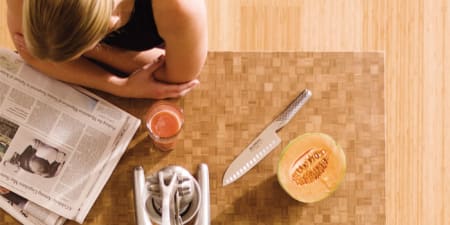
Q: Can butcher block kitchen wood countertops be permanently sealed (waterproofed) and safely? (Not with oils but a true waterproof seal?) The house is 112 years old. The countertops were installed by the previous owners.
—Asked by Karen,Tacoma, WA
A: Repairability is the new sustainability.
Your question is a good one that requires a little background about sealers. There are basically two types of sealers: penetrating and topical. As the name suggests, a penetrating sealer soaks into the substrate (wood, concrete, etc.) and seals the pores from the inside. Once it cures, moisture cannot enter and thus you have a waterproof seal.
Natural oils
Natural oils are excellent penetrating sealers which have stood the test of time. People like them because they are natural, non-toxic, easy to use and they make the wood look richer. When there’s a scratch or gouge, it’s relatively easy to spot repair by sanding and adding a little more oil to blend into the remaining wood.
The appearance, however, may suffer over time because continual use and abuse tends to wear on the surface, leaving it with little protection. The wood can eventually dry out and look aged within a few years. So what can you do?
Take heart! All that’s usually needed is a little attention; a little of the right oil and the wood bounces back to life. That's the real secret behind the repairability of penetrating oil-based sealers. They never die out and, therefore, make the surface highly sustainable. (We’ll discuss some tips for making the surface even more durable shortly).
Topical sealers
Topical sealers, on the other hand, have won homeowners over because they create a thin protective film on the surface that is highly scratch resistant, keeps out moisture and dirt and lasts a long time. Well, at least, that's what they're supposed to do.
Made from a variety of chemicals such as urethane, polyurethane, epoxy, varnish, acrylic, aluminum oxide and various combinations of chemicals, topical sealers can off-gas VOCs for months or years after they’re applied. While there are some new water-based products on the market that have low VOCs, most still contain solvents and dryers that are hazardous to your health. This is certainly not what you want on your countertop.
A good topical sealer is nothing more than 2-3 layers of clear plastic that can be scratched and eroded over time. While they may seem tough, their skin can be pierced by sharp objects or strong acids or alkalines used in food preparation and every day cleaning. And once the skin is pierced, moisture can get underneath the surface; this can cause mold and mildew as well as leave unsightly stains.
The real issue with topical sealers is that they're difficult to spot repair. That's because sanding through the surface and re-coating makes the area stand out and look completely different from the rest of the floor or woodwork. The only solution is to completely re-sand the entire floor or woodwork, and recoat it.
This process creates a lot of airborne particulates that are not good to breathe, and usually requires a complete evacuation of the premises. It can also be time-consuming and quite costly as moving furniture, sanding, cleaning and re-coating takes a lot of labor and is usually done only by professionals with the right equipment. As a consequence, few people touch up their own floors or woodwork.
Because the cost can be so high many people cover up the floor with something else or throw it in the land fill, neither of which is very sustainable.
Topical sealers have dominated the market for so long, with so many new products, that few people hardly talk about penetrating sealers any more. Yet oil-based sealers, which have been around for centuries, are making a strong comeback. In Europe, for example, more than 50% of all new flooring products come prefinished from the factory with a natural oil and wax finish instead of a topical finish.
Food-grade oil-wax finish
Eco-countertop manufacturers such as Teragren, Richlite and Paperstone all recommend the use of a food-grade oil-wax finish to restore the natural look and feel of their countertops. Link to Bioshield Countertop Finish.
The combination of oil and wax creates the best of both worlds--a deep penetrating inner seal and a natural bees wax on the surface. The result looks and feels fantastic and resists moisture and chemicals handily and it’s completely safe with no off-gassing. While it does not last forever, repair and touch up are simple to do once a year or so.
The addition of beeswax and carnauba wax burnished into the surface through buffing creates a beautiful protective patina that will make your butcher block, bamboo or recycled paper countertop live longer without mold or stain, and it will be easy to clean. This only requires a fine white 3M polishing pad that can be used by hand or with a palm sander.
A note on grout stains
One more note on grout stains; there are some new non-toxic stain resistant grouts that will not mold and mildew and never require sealing. One such grout is called QuartzLock which is a urethane grout that is permanent which applies and cleans up very easily.